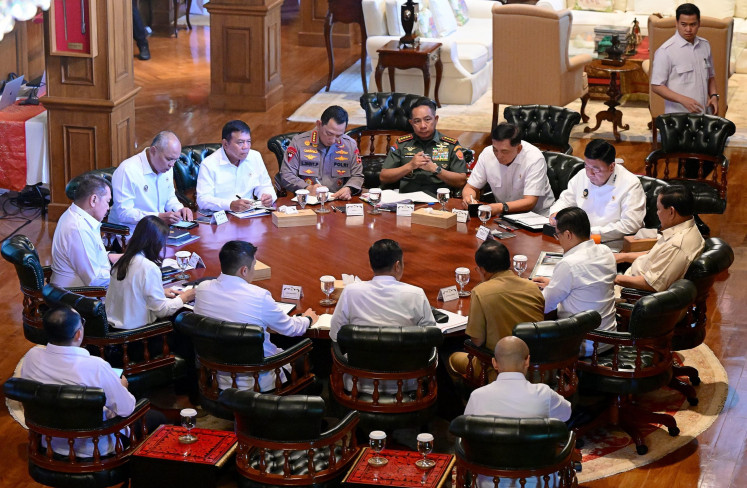Popular Reads
Top Results
Can't find what you're looking for?
View all search resultsPopular Reads
Top Results
Can't find what you're looking for?
View all search resultsGovt drafts joint decree to outlaw Ahmadiyah
The government is preparing a joint decree to outlaw "heretical" Islamic sect Jamaah Ahmadiyah, following a recommendation by a government board
Change text size
Gift Premium Articles
to Anyone
The government is preparing a joint decree to outlaw "heretical" Islamic sect Jamaah Ahmadiyah, following a recommendation by a government board.
The recommendation was discussed Thursday at a meeting led by Coordinating Minister for Political, Legal and Security Affairs Widodo Adi Sucipto.
Widodo said the decree would be drafted by the Religious Affairs Ministry, the Home Ministry and the Attorney General's Office.
"The government will formulate the joint decree based on the 1965 law on the prevention of misuse and disgrace of religion," Widodo said after the meeting at his office.
Attorney General Hendarman Supandji, Justice and Human Rights Minister Andi Mattalata, Indonesian Military chief Gen. Djoko Santoso and National Police chief Gen. Sutanto attended the meeting.
The Coordinating Board for Monitoring Mystical Beliefs in Society (Bakor Pakem) recommended on Wednesday the government ban Ahmadiyah for failing to commit to the 12-point declaration it signed in January.
The declaration acknowledged mainstream Islamic teachings and abandoned the sect's "deviant" beliefs. This included recognizing Muhammad, not Mirza Gulam Ahmad, as the last prophet.
Widodo ordered the police to tighten security to prevent potential violence and anarchism following the ban on Ahmadiyah.
"The decree should consider various aspects, especially stability, so as to be alert to potential conflict stemming from various groups' dissatisfaction," he said.
The recommendation has sparked debate among Islamic groups. Most have come out in support of the ban even though Ahmadiyah is a nonviolent sect.
Nahdlatul Ulama (NU) and Muhammadiyah, the country's two largest Muslim organizations, said the government has the authority to ban Ahmadiyah.
They said the government must ensure the safety of Ahmadiyah members following the recommendation.
"In Islam, Ahmadiyah is deviant. It is the government's domain to outlaw it or not for stability reasons," NU chairman Hasyim Muzadi said.
Muhammadiyah chairman Din Syamsuddin said there should be efforts to persuade Ahmadiyah followers to return to mainstream Islamic teachings.
"It won't be easy to ban Ahmadiyah. The government may disband any sect legally and formally, but culturally their beliefs may continue to exist.
"Thus, a persuasive dialogue is the best way to convince them," Din said.
Extremist groups, including the Islam Defenders Front and the Muslim People's Forum, are using the recommendation by Bakor Pakem to pressure the government to dissolve Ahmadiyah immediately.
The Maarif Institute for Culture and Humanity said banning Ahmadiyah would violate the Constitution, which respects freedom of religion.
Institute executive director Raja Juli Antoni said the government should not intervene in religious matters and urged the President to annul the decision.
The move against Ahmadiyah was also condemned by the Alliance for Religious and Belief Freedom.
Ahmadiyah spokesman Fazal Mujeeb said the group would continue its activities and would not respond to the ban.
"The government has no reason to ban our activities. They simply don't want to listen to us and have based this decision on a one-sided view," he said.
"We are on the right Islamic path. We are part of the Muslim community, even though we have some different opinions."
Facts about Ahmadiyah
* An Islamic sect founded in Qadian, Punjab, India, in 1889 by Mirza Ghulam Ahmad (1839-1908), who claimed to be the mahdi -- a figure expected by some Muslims to appear at the end of the world.
* The group is guided by a Khalifa (Caliph), its spiritual leader, who claims to commune with the Almighty and be the successor to Mirza Ghulam Ahmad.
* Ahmadiyah entered Indonesia in 1925.
* There are two groups of Ahmadiyah in Indonesia -- Jamaah Ahmadiyah Indonesia (JAI), also known as Ahmadiyah Qodiyani, and Indonesian Ahmadiyah Movement (GAI), also called Ahmadiyah Lahore.
* JAI believes Mirza Ghulam Ahmad was the last prophet after Muhammad, while GAI only considers Mirza to be a reformer.
* The Indonesian Ulema Council declared both JAI and GAI heretical sects.
* Attacks on Ahmadiyah increased following the council's fatwa.
Source: Various sources










